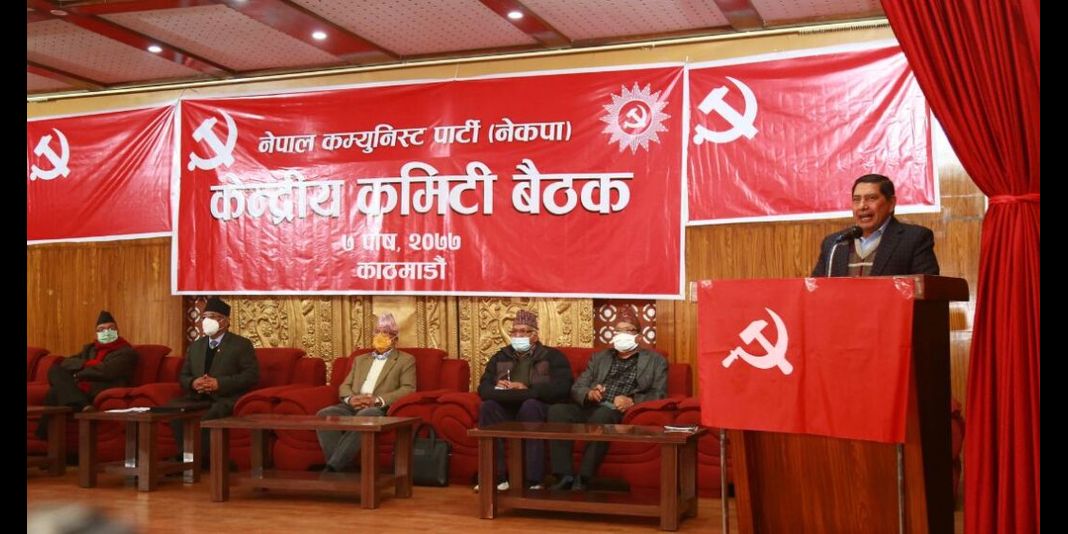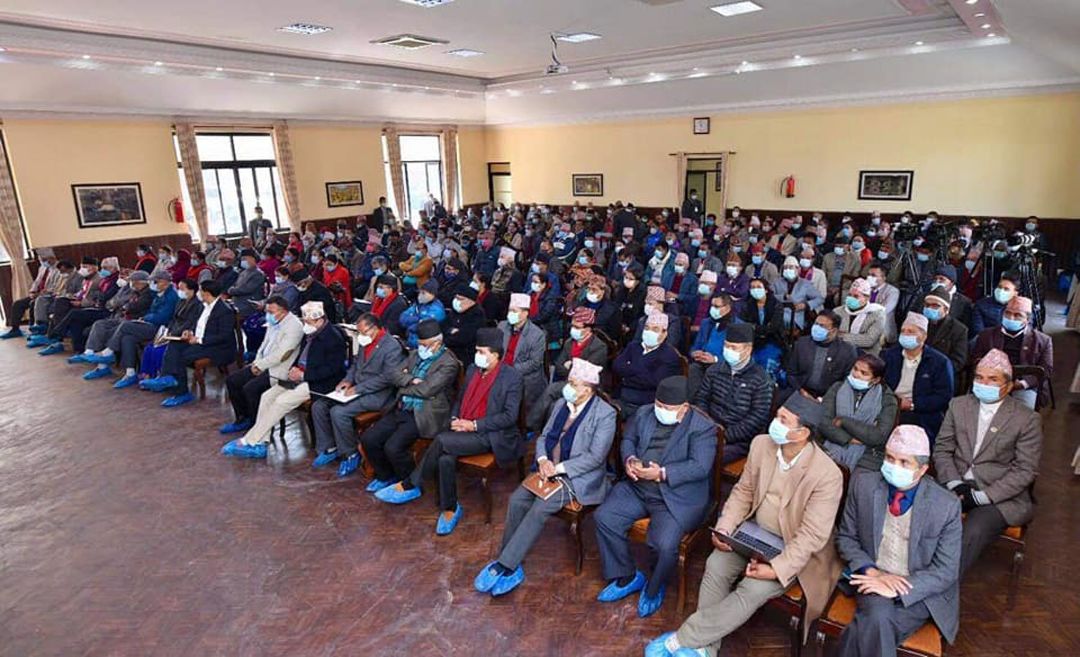
Features
5 MIN READ

NCP faction names Madhav Kumar Nepal as the party chief to replace KP Oli as Oli expands the party’s central committee by incorporating his loyalists

Before merging the country’s two most influential communist parties to form the Nepal Communist Party (NCP), the chiefs of both parties were named as chairmen sharing equal powers. Led by former Maoist rebel chief Pushpa Kamal Dahal ‘Prachanda’ and erstwhile CPN-UML chief KP Sharma Oli, the barely three-year-old party is now set to officially split. The duo, who had then described themselves as the co-pilots of a jet heralding a new era in Nepali politics, have now parted ways.
On Tuesday, a group of leaders close to Dahal and Madhav Kumar Nepal expelled Oli from the position of party chief while appointing Nepal in his place. Former prime minister Nepal had been at the helm of the then Communist Party of Nepal-Unified Marxist Leninist (CPN-UML) since the untimely demise of its late, charismatic leader Madan Kumar Bhandari in 1993. Nepal worked as the party chief for 15 years, but never succeeded in beating rival parties in the elections to form the government in the Parliament. Consequently, he stepped down from the position of party chief in 2008 when his party faced a humiliating defeat in the first Constituent Assembly elections. He himself was defeated during the election in two constituencies from Rautahat and Kathmandu.
Despite his defeat, Nepal was successful in securing his position as a Constituent Assembly member through the proportional representation system. He later even became elected as the prime minister after the majority commanded that Dahal resign from the position over the appointment of the army chief in 2009. Back then, Dahal had announced ‘urban protests’ to topple the Nepal-led majority government. During his 22-month-long stay in power, Nepal managed to significantly weaken the UCPN (Maoist) party’s strength by merging its armies into the Nepal Army and sending UNMIN back from Nepal.
This time, however, Dahal and Nepal have come together at the cost of unseating Oli from both the positions of party chief and prime minister. Nepal and Dahal have reportedly reached the conclusion to share the key positions between them. In the vote of no-confidence filed at the Parliament, a majority of ruling lawmakers have proposed that Dahal be named as the new prime minister while giving a larger party role to Nepal. The Nepal-Dahal faction also wants to appoint Jhalanath Khanal as the new president, removing the incumbent Bidya Devi Bhadari who has been seen as nothing more than a rubber stamp of the Oli administration.
With the aim of primarily dethroning Oli from the prime ministerial berth, the faction had been preparing to file a vote of no-confidence at the Parliament this week. But anticipating this, Oli abruptly dissolved the Lower House of the Parliament wherein NCP had been commanding a nearly two-thirds majority.
Even as their efforts to remove Oli from the prime ministerial position went futile, the rival faction led by Dahal announced Oli’s removal from the position of chairman. On Tuesday, the faction named former prime minister and senior NCP leader Madhav Kumar Nepal as one of the party’s chairman, with Dahal himself to continue as the other chairman.
“Comrade KP Sharma Oli acted against political change, against the Constitution, against democracy, the party, and the spirit of party unification. He has been removed from his responsibility as the party chief as a part of disciplinary action for acting against the party,” said Narayan Kaji Shrestha, a leader of the Dahal-Nepal faction.
The decision of a disciplinary action against Oli has been briefed at the Election Commission (EC). Oli has also updated the election body about his decision to expand the party’s central committee. In the briefing submitted to the EC, Oli has mentioned that he's the official chairman of the ruling NCP.

Just before being sacked from the position of party chairman, Oli had organised a separate gathering of the party by inviting his loyalists at his residence in Baluwatar. During the meeting, he revamped the party’s central committee by including 643 new members in the previously 556-membered central committee. The Oli faction removed Narayan Kaji Shrestha from the role of the party’s spokesperson. Pradeep Gyawali, who is now working as foreign affairs minister of the Oli administration, was announced his successor.
Leaders close to Oli said Shrestha was removed from the responsibility of party spokesperson after he was found “briefing the media based on his personal ambition and personal views instead of disseminating the party’s official position in public forums.”
“No one has been booked from the side of the prime minister. Some comrades have been added to the central committee. NCP still remains united,” said Gyawali.
Both the Oli and Dahal factions have been adopting all possible measures in order to reclaim influence in both the party and the government. This has created chaos in the ruling NCP and beyond. Party cadres divided into pro-Oli and anti-Oli camps have been carrying out protests at the central and local levels. Minor clashes were reported in the district while cadres fought on both sides, for and against the government.
The split at the centre is likely to cause a split in the provincial governments as well. Out of the seven provincial level governments, NCP has been leading provincial governments in six provinces. Party cadres have started to capture party offices and resources in districts and provinces in order to influence local politics. Provincial governments have started to make pending appointments so that they can lure more cadres.
Even as the Nepal-Dahal faction failed to remove Oli from the post of prime minister in its first attempt, rival lawmakers still want to foil the proposed election so that they can immediately remove Oli from power. In order to oust Oli from power, they filed a writ petition at the Supreme Court on Tuesday demanding to annul Oli’s election plans and reinstate the Parliament.
The highest court is scheduled to begin a hearing on the writ petitions against the PM’s move beginning Wednesday. The new Constitution does not give the PM the prerogative to dissolve the Parliament even if they command a majority in the House. As per the constitution, the House can be dissolved only if it fails to elect a prime minister or the nominated prime minister fails to secure a vote of confidence in the Parliament. The Parliament must exhaust all options to form a government to recommend for dissolution of the House.
PM Oli recommended the dissolution of the House to save his post and his move has been criticised by political parties, legal experts, and the public as an unconstitutional move. Oli, however, has been defending his move, saying he was forced to dissolve the House as his party comrades wanted to remove him.
Bhadra Sharma Bhadra Sharma is a Kathmandu-based freelance journalist. He is also co-author of the book 'Impunity and Political Accountability in Nepal'.


COVID19
News
5 min read
A daily summary of Covid19 related developments that matter
Perspectives
Opinions
4 min read
Development and environmental preservation are not antithetical goals
Features
8 min read
In a Newa village south of Lalitpur Municipality, a community grapples with the prospect of monumental change.
Features
3 min read
In the face of repeated denials by the governments of China and Nepal, a team of Nepalis has presented evidence of Chinese presence inside Humla
Features
4 min read
The apex court decision about the polls will set in motion repercussions that could change many things in Nepali politics
Perspectives
8 min read
Nepal will be inviting FDI in agriculture, when it is India’s involvement of corporate interests in its agriculture sector that has led to massive protests.
Perspectives
7 min read
Lamjung residents demand accountability from the government and European Union funders
News
4 min read
Students at the university have been protesting the varsity’s decision to hold in-person exams at a time when Covid-19 cases are increasing by the day